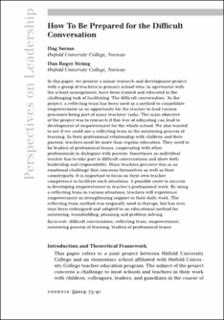How To Be Prepared for the Difficult Conversation
Peer reviewed, Journal article
Published version

View/
Date
2019Metadata
Show full item recordCollections
Original version
Vodenje v vzgoji in izobraževanju. 2019, 17 (3), 75-92.Abstract
In this paper, we present a minor research and development project with a group of teachers in primary school who, in agreement with the school management, have been trained and educated in the challenging task of facilitating ‘The difficult conversation.’ In the project, a reflecting team has been used as a method to consolidate empowerment as an opportunity for the teacher to lead various processes being part of many teachers’ tasks. The main objective of the project was to research if this way of educating can lead to development of empowerment for the whole school. We also wanted to see if we could use a reflecting team in the mentoring process of learning. In their professional relationship with children and their parents, teachers must be more than regular educators. They need to be leaders of professional teams, cooperating with other professionals in dialogues with parents. Sometimes an individual teacher has to take part in difficult conversations and show both leadership and responsibility. Many teachers perceive this as an emotional challenge that concerns themselves as well as their
counterparts. It is important to focus on their own teacher competence to facilitate such situations. A possible route to success is developing empowerment in teacher’s professional work. By using
a reflecting team in various situations, teachers will experience empowerment as strengthening support in their daily work. The reflecting team method was originally used in therapy, but has over time been redesigned and adapted to an educational method for mentoring, teambuilding, planning and problem solving.